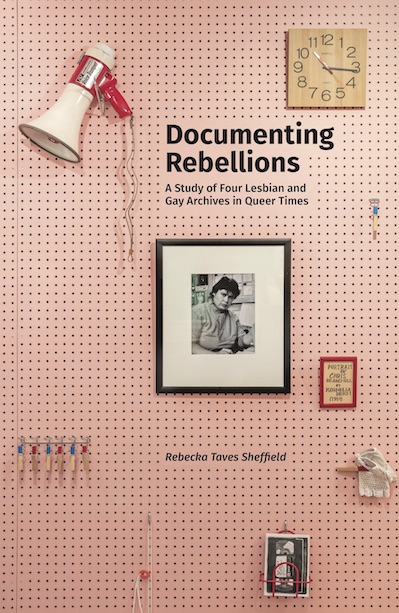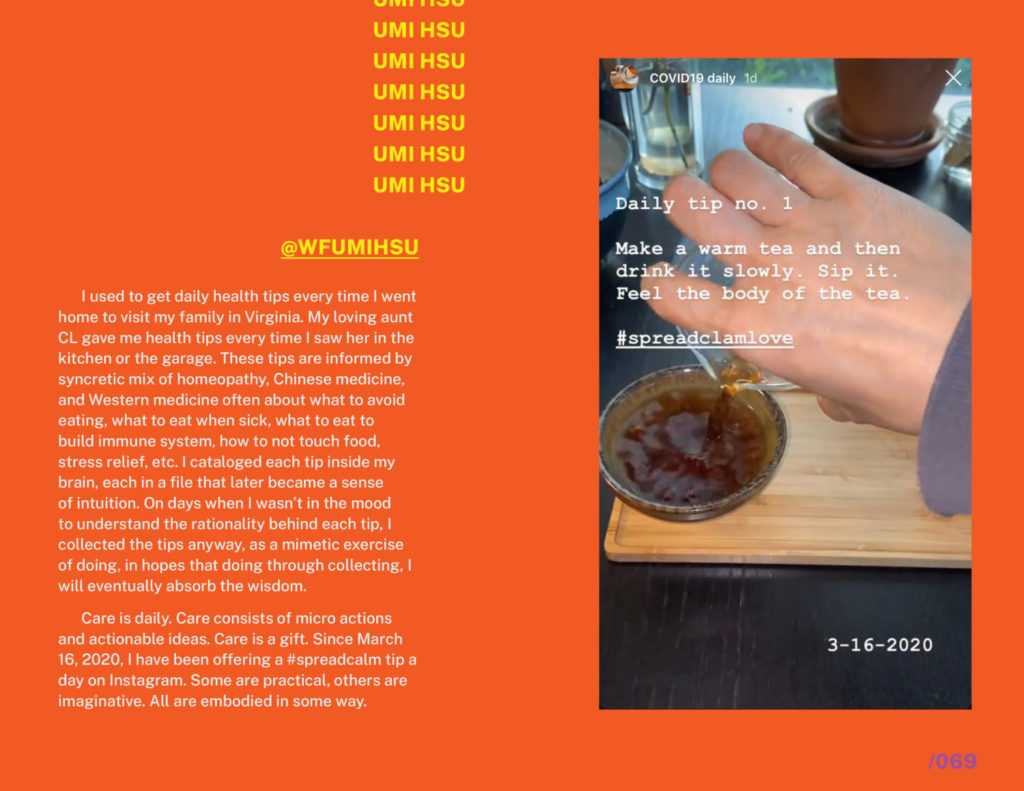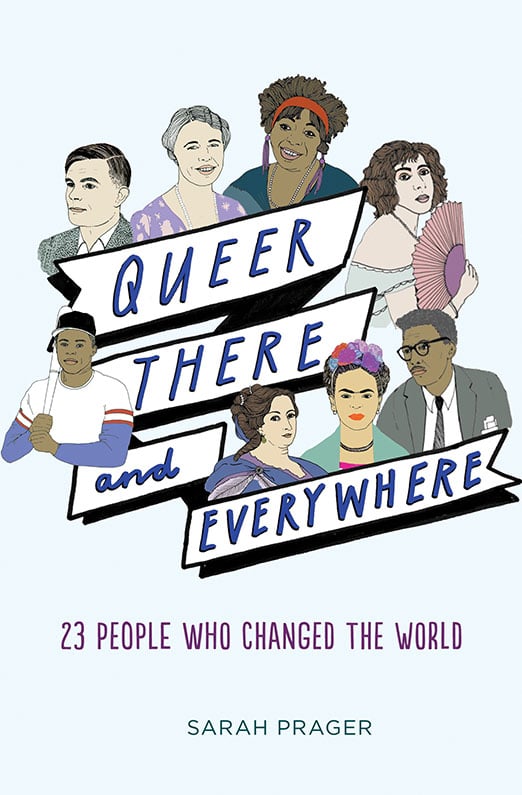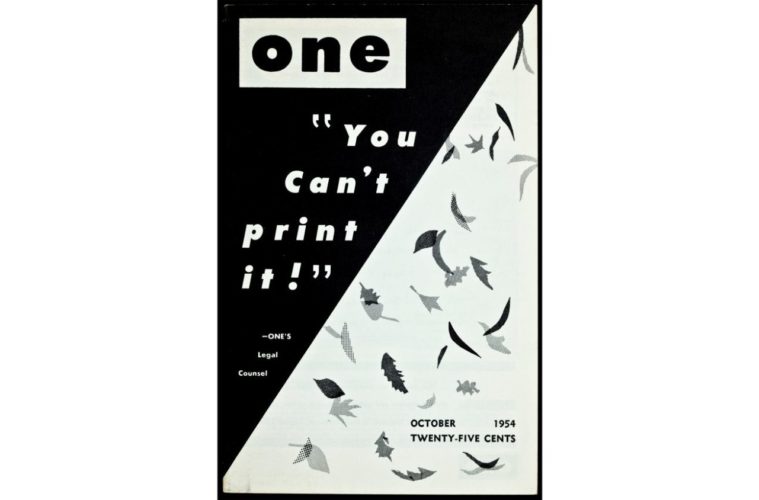The ONE National Gay & Lesbian Archives at the University of Southern California Libraries is in fact the biggest collection of LGBTQ materials in the world — some three million objects encompassing books, zines, posters, recordings, interviews, photographs, newspaper articles, letters, ephemera, pieces of pop culture, political activism, and academic scholarship, biographical materials, arts, music, theater, literature and so much more.
Founded in 1952 by Jim Kepner, the publisher of the historically progressive ONE Magazine, with archival collections gifted to the USC Libraries in 2010, the ONE Archives Foundation is dedicated not only to the preservation, curation, study and dissemination of their considerable holdings, but increasingly to amping up their public-facing engagements and dialog with the activism of today. By weaving together threads of the past and present, their hope is to rekindle interest in the archive in service of the ongoing movement and its dialogs. To energize this effort, they’ve hired W.F. Umi Hsu as the Foundation’s first Director of Content Strategy.
We spoke to Hsu as long-planned Pride Month actions — the calendar already disrupted by COVID-19 — coincided with the start of the ongoing George Floyd demonstrations. As they told the Weekly, the part of their job that has only grown more urgent is the mission to “pull out strings of history relevant to the present moment.”
“I started in October and delivered my three-year strategy report in January! So a lot of plans have been retooled in short order,” Hsu says. “We can’t physically go in; access to physical materials is zero right now.” About 30,000 objects have been digitized, which is both a huge amount and just 1 percent of their full archive. Yet, the impulse to fulfill their role in the larger cultural ecosystem feels more urgent than ever.
That is where the #Queerantine campaign came from. The web and social media project was initially launched in response to the pandemic conditions of social isolation, as figures from the archive’s curatorial, research and foundation staff pick moments and materials to highlight. The idea is to engage the core holdings with contemporary recommendations and introduce the lot to new audiences. “Queer history is vibrant,” says Hsu. “It deserves redefined relevance in the current moment.”

#Queerantine pick, author Rebecka Taves Sheffield
The series is up to about a dozen editions (one a week) and has pointed to some 80 eclectic projects, from pulp fiction to modern-day cabaret, podcasts, back issues of ONE magazine itself, follow-worthy queer culture Instagram accounts from around the world, the center’s current (now online) exhibition Safer at Home, and other thoughtful and fabulous surprises.
In the weeks after COVID hit, another major project blended a foundation in history with creative responses from today. “Since the start of the pandemic, people have been comparing between COVID-19 and HIV/AIDS,” says Hsu. “At the start of sheltering at home, we turned our programming related to Metanoia, an exhibition that centers black women and women of color’s experience of AIDS and related activism, into a rapid response to COVID-19.”
This took the form of a zine called What Does A COVID-19 DOULA Do?, for which they worked with the WWHIVDD (What Would an HIV Doula Do?) collective and invited 24 artists, curators, writers and archivists to contribute their “meditations and reflections on the pandemic and its community impact.”

What Does A COVID-19 DOULA Do? (Courtesy of ONE Archives)
The resonance between COVID and AIDS got a tragic amplification. The recent death of Larry Kramer, the AIDS activist who founded ACT UP, recalled to mind how each of these public health crises were and are currently exacerbated by callous government non-responses, and both disproportionately impacting and traumatizing differently vulnerable communities. This resonance increased and broadened in the context of the current wave of Black Lives Matter demonstrations, whose tactics of loud and peaceful protest are gaining traction daily and undeniably moving the needle toward justice.
“People are bringing back the “Silence=Death” slogan and borrowing the pink triangle Silence=Death poster as a part of their activist messaging associated with both COVID-19 and Black Lives Matter,” notes Hsu. “Members of the collective who designed the poster inverted the pink triangle — a symbol used in Nazi Germany to identify homosexuals in concentration camps. This week, I saw variations such as ‘White Silence=Black Death’ in a protest photo and on social media. This image brings together three histories: Nazi Germany around WWII, AIDS activism of the 1980s,and BLM of our present moment. I’m hoping that this indicates that people are having intergenerational and intersectional dialogs. With conversations on histories, we can build coalitions and create change toward collective freedom.”
In 1970, Christopher Street West, an organization formed in Los Angeles in response to the Stonewall Uprising, organized the first permitted Pride parade. While researching this history, Hsu found newspaper clippings documenting police brutality on gay bodies. Before that, the Black Cat Riots had happened New Year’s Eve 1967 in Silver Lake in response to violence from the LAPD. The Stonewall Riots took place in New York City 1969 and was a part of the civil rights struggle of its time. Marsha P. Johnson, a black trans woman, and Sylvia Rivera, a Latina trans woman, spearheaded the Stonewall organizing efforts. “They were strategic, courageous and resilient,” says Hsu, “just as the black civil rights protesters were.” As are the demonstrators of today.
How we store our past for the future has long term consequences, and ONE is always accepting donations. Part of its mission is to be a community archive, just as it was born from publishing early LGBTQ periodicals. With “curiosity and audacity,” says Hsu, “I hope that by putting eclectic content out there we will encourage more diversified stories.”
Check out their Pride virtual event series honoring queer liberation, including Dear ONE featuring George Takei. Find out more at onearchives.org and one.usc.edu, and follow the conversation on Twitter at @ONEarchives.

Author Sarah Prager in a #Queerantine edition (ONE Archive)
Advertising disclosure: We may receive compensation for some of the links in our stories. Thank you for supporting LA Weekly and our advertisers.

